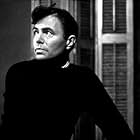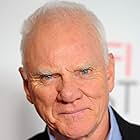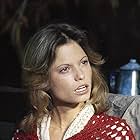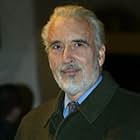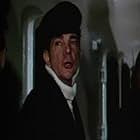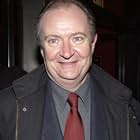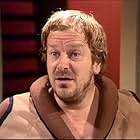IMDb RATING
6.0/10
2.3K
YOUR RATING
During World War II, a Basque shepherd is approached by the underground, who wants him to lead a scientist and his family across the Pyrenees while being pursued by a sadistic German.During World War II, a Basque shepherd is approached by the underground, who wants him to lead a scientist and his family across the Pyrenees while being pursued by a sadistic German.During World War II, a Basque shepherd is approached by the underground, who wants him to lead a scientist and his family across the Pyrenees while being pursued by a sadistic German.
Jim Broadbent
- German Soldier
- (uncredited)
Frederick Jaeger
- German Major
- (uncredited)
Terence Maidment
- Second German Sentry
- (uncredited)
Terry Yorke
- First German Sentry
- (uncredited)
Storyline
Did you know
- TriviaIn an interview with Starlog Magazine, published in September 1983, Malcolm McDowell said of this movie: "That movie contains some of the best work I've ever done. I managed to pack into a dozen scenes with the whole period of Nazi tyranny in a convincingly evil way." Also, Malcolm McDowell said of this movie in Starlog Magazine, published in July 1995: "I played this real nasty Nazi who was chasing these people across the Pyrenees. We all knew real early on that the movie was not going to be any great work of art and so I was determined to have some fun with it. My attitude was that if I was going to play a Nazi, I was going to take it totally over the top and do it right. I ended up playing the character like a pantomime queen. What I was doing was so far out that James Mason turned to me one day and said, 'That's wonderful dear boy, but are you in our film? You seem to be doing something different from the rest of us'."
- GoofsWhen Von Berkow uses binoculars at the mountains, a few camera movements are recognizable, revealing that binocular frame was added in post-production.
- ConnectionsEdited from On Her Majesty's Secret Service (1969)
Featured review
...I managed to pack into a dozen scenes with the whole period of Nazi tyranny in a convincingly evil way." - Malcolm McDowell about his work in The Passage.
When I saw The Passage back in 1981, in Moscow, I had no idea that it had been a big flop in the USA where it only lasted a week upon theatrical release, that it was considered a bad movie a failure. It would be much later that I recognized very famous and talented actors who were in the film, James Matson, Anthony Quinn, Christopher Lee, and Patricia Neal. The film was directed by J. Lee Thompson, the Oscar nominated director of highly successful The Guns of Navarone (1961). By the time I was watching The Passage at the theater, I had not seen Stanley Kubrick's A Clock Work Orange or notorious Caligula, and I did not know what Malcolm McDowell was capable of as a screen villain. I did know McDowell from the Lindsay Anderson's O Lucky Man that also had been released theatrically in Moscow several years prior The Passage. O lucky Man had left a deep impression on me and huge part of it was McDowell's performance as Mick Travis, the young naive man with the most charming smile who wanted to succeed in this world. Watching McDowell in The Passage playing the psychotic obsessed Nazi chasing the family of the anti-fascist scientist across the Pyrenees I was horrified and genuinely scared. Every time he would enter the screen, I felt physically sick anticipating some horror act to follow and McDowell never disappointed. I won't argue that the movie may not be a great or even a good one but I do remember McDowell's performance all too well, and I could not forget him in the movie for 28 years. Now, after I've seen so many movies and memorable performances, I realize that McDowell was over the top and judging by his own words, he knew it very well and did it on purpose:
"I played this real nasty Nazi who was chasing these people across the Pyrenees. We all knew real early on that the movie was not going to be any great work of art and so I was determined to have some fun with it. My attitude was that if I was going to play a Nazi, I was going to take it totally over the top and do it right. I ended up playing the character like a pantomime queen. What I was doing was so far out that James Mason turned to me one day and said, 'That's wonderful dear boy, but are you in our film? You seem to be doing something different from the rest of us'..."
If after so many years, one performance in a supposedly bad movie stands out and you can't get it out of your mind, and you remember the exact day when you saw that movie, who you saw it with and how you felt, for me it means that the movie was not bad at all.
When I saw The Passage back in 1981, in Moscow, I had no idea that it had been a big flop in the USA where it only lasted a week upon theatrical release, that it was considered a bad movie a failure. It would be much later that I recognized very famous and talented actors who were in the film, James Matson, Anthony Quinn, Christopher Lee, and Patricia Neal. The film was directed by J. Lee Thompson, the Oscar nominated director of highly successful The Guns of Navarone (1961). By the time I was watching The Passage at the theater, I had not seen Stanley Kubrick's A Clock Work Orange or notorious Caligula, and I did not know what Malcolm McDowell was capable of as a screen villain. I did know McDowell from the Lindsay Anderson's O Lucky Man that also had been released theatrically in Moscow several years prior The Passage. O lucky Man had left a deep impression on me and huge part of it was McDowell's performance as Mick Travis, the young naive man with the most charming smile who wanted to succeed in this world. Watching McDowell in The Passage playing the psychotic obsessed Nazi chasing the family of the anti-fascist scientist across the Pyrenees I was horrified and genuinely scared. Every time he would enter the screen, I felt physically sick anticipating some horror act to follow and McDowell never disappointed. I won't argue that the movie may not be a great or even a good one but I do remember McDowell's performance all too well, and I could not forget him in the movie for 28 years. Now, after I've seen so many movies and memorable performances, I realize that McDowell was over the top and judging by his own words, he knew it very well and did it on purpose:
"I played this real nasty Nazi who was chasing these people across the Pyrenees. We all knew real early on that the movie was not going to be any great work of art and so I was determined to have some fun with it. My attitude was that if I was going to play a Nazi, I was going to take it totally over the top and do it right. I ended up playing the character like a pantomime queen. What I was doing was so far out that James Mason turned to me one day and said, 'That's wonderful dear boy, but are you in our film? You seem to be doing something different from the rest of us'..."
If after so many years, one performance in a supposedly bad movie stands out and you can't get it out of your mind, and you remember the exact day when you saw that movie, who you saw it with and how you felt, for me it means that the movie was not bad at all.
- Galina_movie_fan
- Jan 7, 2010
- Permalink
- How long is The Passage?Powered by Alexa
Details
Box office
- Gross US & Canada
- $1,101,186
- Opening weekend US & Canada
- $70,461
- Mar 11, 1979
- Gross worldwide
- $1,101,186
Contribute to this page
Suggest an edit or add missing content











